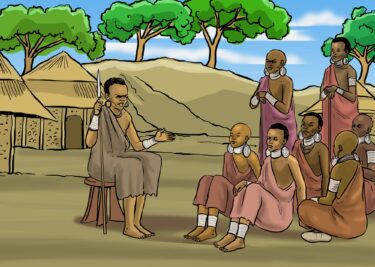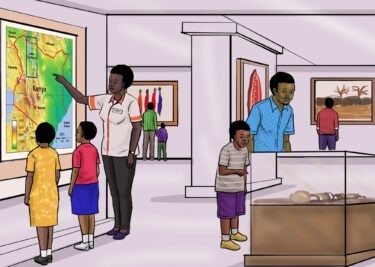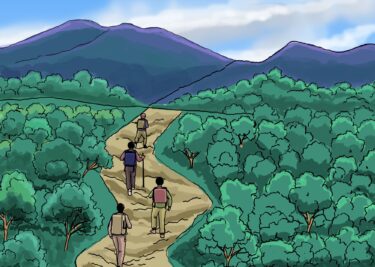The Lazy and Unkind Man

Hadithi Hadithi?
Hadithi Njoo!
This is the story of a man whose laziness and unkindness made him suffer.
Hadithi Hadithi?
Hadithi Njoo!
A long time ago there was a small village at the center of a big farm called Marani. It was here that the small farming community once lived and relied on farming for economic growth and food production. It is also in this town that we find Mr. Makomboki.
Mr. Makomboki’s father was a wise man who managed his finances well. He had grown several crops on his plantation and had been loved by the villagers for his kindness. Sadly, he was old and wasting away. Before his death, he ordered that his only shamba – a large plantation of about 10 acres – be given to his son. After his father’s death, Mr. Makomboki neglected his inheritance and instead sold sections of the shamba to members of the community to work on it. When the fruits and vegetables were ready for harvest, the same Mr. Makomboki showed up out of nowhere to beg, sometimes demand, for food. This habit made the villagers very upset, but none of them dared to stand up to Mr. Makomboki.
One day, a villager who had rented a section of Mr. Makomboki’s shamba paid the old man a visit. The man’s name was Mr. Mucina, and he was empathetic of Mr. Makomboki’s laziness and decided to speak with him to understand his financial predicament despite selling his father’s fortune.
“Mr. Makomboki, there are some villagers who despise you, but me, me I care about you. I want to buy you a few seeds and fertilizer, and give you some money to employ a few workers who will work on the section of shamba you have left.”
Mr. Makomboki smiled. The collection of his teeth was a splendid brown. He responded, ever so politely, “Yes, indeed, Mr. Mucina. You are God sent to those of us that are hopeless in life.”
Mr. Mucina concluded their conversation by cautioning Mr. Makomboki to use the money he would give him wisely otherwise it would be depleted before harvesting season. Mr. Makomboki nodded so fast his head looked like it would fall off.
Three weeks passed and Mr. Mucina returned to Mr. Makomboki’s hut and gave him seeds, fertilizer and money as promised. Mr. Makomboki counted the money out loud. “One dhousand shirrings, two dhousand shirrings,…… ten dhousand shirrings! Oh my!” He folded the money so precisely and put it in the front pocket of his tattered pants. Mr. Makomboki thanked Mr. Mucina as the latter parted.
The next day Mr. Makomboki woke up bright and early. He sat outside, looking at the clouds in the sky giving way to the sun. He did this as his hand hovered around his pocket where his money still was, and he said to himself, “What will I do with all this money? Hm?” Just then, as though out of nowhere, he started craving tea and mandazi. Mr. Makomboki walked to a mabati café a few minutes away and exposed his greed; he ordered a kettle of chai and twenty mandazis. He devoured the snack, gulped the beverage, paid the café owner and left. But as he began to leave, the café’s owner called after him. “Mr Makomboki! Mr Makomboki! You have forgotten your change.” The owner, clad in old Bata slippers chased after Mr. Makomboki, who stopped and laughed. “You peasant! Keep that change. It looks like you need it.”
That evening, Mr. Makomboki spent the rest of his money at a spirits pub. He woke up by the roadside, hungry and with no money. He returned home and thought about his actions the day before, but there was no way to retrieve his money, so he went to the villagers that had harvested that morning and begged for food. No one agreed to share their harvest with Mr. Makomboki. No one but the café owner who agreed to feed Mr. Makomboki. The café owner didn’t shy away from telling Mr. Makomboki that he was upset with his behaviour the day before and advised him to start planting his own food. These are the words that sat with Mr. Makomboki as he walked back home, took the seeds and fertilizer Mr. Mucina had given him and started planting in preparation for the rain.
The words of a forgiving man, the café owner, had an impact on Mr. Makomboki and when the next harvest season came around, Mr. Makomboki had enough food to sell and have for himself. He was cured of his laziness. He remembered the kindness of Mr. Mucina and the café owner and vowed to be kind to people.
QUESTIONS
1. What was the name of the small village where Mr. Makomboki lived?
2. How much money did Mr. Makomboki receive from Mr. Mucina?
3. What lessons do we learn from this story?



